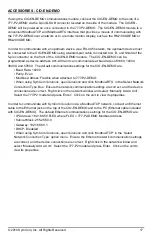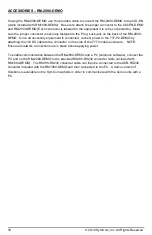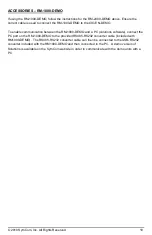
© 2010 SymCom, Inc. All Rights Reserved 7
TC
-
Trip Class. Determines how quickly the 777-P2-DEMO will trip when an overcurrent
(overload) condition is detected. TC is a dual-function setting—both a thermal trip class
(NEMA standard) and a linear trip delay (in seconds) can be set.
While the standard trip classes are 5, 10, 15, 20, and 30, TC can be set from 2–60, with or
without jam protection. The trip class setpoint is the time in seconds that the device will take
to trip when any phase current is greater than or equal to 600% of the OC setpoint. These
additional “non-standard” trip classes allow the unit to follow a trip curve in-between the
“standard” trip class curves shown in Figure 1.
Trip classes 2–60 can be set from approximately the 7 o’clock to 10 o’clock position with the
DISPLAY/PROGRAM knob. Trip classes J02–J60, which include jam protection, can be set
from approximately the 10 o’clock to 1 o’clock position. This additional jam protection
feature, when enabled, is initiated 1 minute after the motor starts and provides a 2-second
trip delay for motors exceeding 400% of the OC setting.
The linear overcurrent trip delay can be set from approximately the 1 o’clock to 5 o’clock
position from 0–60 seconds (L00–L60) or to “oFF.” If TC is set to L00, the 777-P2-DEMO
will trip off within 1 second after current reaches the OC setpoint. If both trip class and linear
trip delay settings are programmed, the 777-P2-DEMO will follow the faster trip time. For
example, TC is set to J15 and L20, and the amperage is 200% of the OC setting. Following
the trip class 15 curve, the 777-P2-DEMO will trip off in approximately 100 seconds. The
777-P2-DEMO will follow the linear trip delay setting because it is faster, and the relay will
trip off in 20 seconds.
The motor manufacturer should be contacted for an exact TC setting. Table 3 describes the
trip classes, and Figure 3 shows the trip class curves.
SET AT "5."
RD1
- Restart Delay One. Rapid-cycle timer, in seconds (default). The purpose of this timer is to
provide protection against short cycling and to allow adequate cool down time between
motor starts. This timer is initiated when power is first applied to the unit. If no voltage fault
conditions exists, the output relay will energize (the NO will close and the NC will open) as
soon as RD1 timer expires. In most cases, this is set to 20-30 seconds. This should provide
adequate protection for successive power outages or short cycling caused by other motor
controls. This timer is also initiated when motor current goes to zero. Setting RD1 to zero
will turn off this feature and ensure that when an alarm circuit is used, an alarm will sound
only when there is a fault or power to the unit is lost.
SET AT "4."
RD2
- Restart Delay Two. Referred to as a motor cool-down timer, in minutes (default). RD2 is
used to restart the motor after a trip due to a current unbalance, current single-phasing, or
an overcurrent condition. A setting of 5-10 minutes will give most motors adequate time to
cool down after an overcurrent condition. The motor manufacturer should be contacted for
an exact value.
SET AT "2."
RD3 -
Restart Delay Three. This timer, in minutes (default), only initiates after an undercurrent trip
and is referred to as a dry-well recovery timer in pumping applications. This is set according
to the time it takes for the well to recharge after pumping dry. This setting varies widely by
application and there is no typical setting. RD3 can be set from 2-500 minutes or to ”A” to
enable the automatic Dry-Well Recovery Calculator.
The Automatic Dry-Well Recovery Calculator allows the 777-P2-DEMO to automatically
select a restart delay based on the run time of the last run cycle before tripping on an
undercurrent fault. Table 2 shows the next restart delay vs. run time. In general, a longer
run time produces a shorter restart delay. This feature allows the 777-P2-DEMO to optimize
running and rest times automatically.
SET AT "2."
Run Time
Next Restart
Delay (minutes)
Starts/Hr
> 1Hr
6
10
30 min.- 59.99 min.
15
4
15 min.- 29.99 min.
30
2
< 15 min.
60
1
TABLE 2: Automatic Dry-Well Recovery Timer

































